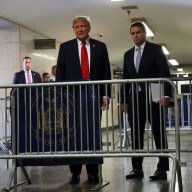OTTAWA – The Harper government will offer modest tax breaks Tuesday amid a shower of deficit spending aimed at helping Canada sprout back from a worldwide economic drought.
Officials say the tax measures are aimed primarily at the middle class, and designed to make people spend.
An unprecedented torrent of stimulus measures will wipe out more than a decade of fiscal prudence as the government plans a $64-billion deficit over two years – Canada’s first slide into the red since 1996.
The deficit is not the biggest in Canadian history, but the fiscal turnaround has been historic in its speed and scope.
Just weeks after shrugging off warnings from economists that a recession and deficit were imminent, the Conservatives now agree swift, deep action is needed to stave off disaster.
In the latest stimulus announcement, the government said Monday it would spend $7 billion on public infrastructure – especially “shovel-ready” road, bridge and sewer projects.
That’s on top of the billions it has already promised for items ranging from social housing to worker retraining.
The tax breaks may be among the lone surprises left in a budget whose contents were largely divulged by the government over the last several days.
Amid speculation the government could offer spending vouchers to get people back into stores, the prime minister remained coy Monday about what form the tax measures would take.
“Some of those tax initiatives will involve getting money in consumers’ pockets,” Stephen Harper told CTV.
“So that (way) ordinary people, working class people, middle class people, can spend money.”
Public Works Minister Christian Paradis hinted Monday that the tax breaks could take a non-traditional form. He said the Tories envisioned modest measures that would make people spend, instead of simply paying down their regular monthly bills.
Two other government officials said that the tax measures will be substantive but not large, and are intended to provide a quick jolt to the economy.
The unique historical circumstances were underscored Monday as a chastened Harper government opened a new session of Parliament with one of the briefest, gloomiest throne speeches in memory, replete with references to war and the Great Depression.
The four-page document was printed on pages barely bigger than a greeting card, but crammed into that uncommonly short address were 10 variants on the word, “economy” or “economic.”
The speech, read by Gov. Gen. Michaelle Jean, laid out the broad strokes of an economic rescue plan, with the all-important details to be revealed in the budget.
It outlined a six-point action plan that includes infrastructure spending, ensuring access to credit, stabilizing financial institutions, and helping the most vulnerable.
In addition to the $7 billion for infrastructure, the government has confirmed a number of spending measures in the budget:
-$1.5 billion to help train laid-off workers and provide them with new skills.
-$1 billion to help the hardest-hit communities adjust to the economic downturn, especially one-industry towns or those dependent on agriculture, mining and forestry.
-$1 billion to renovate social housing.
-$600 million for aboriginal housing.
-$550 million for farmers
-$150 million to help the forestry sector develop new technologies and promote the industry abroad.
-Billions of dollars in loan guarantees for the auto industry.
Monday’s speech made only indirect reference to the variety of other promises outlined in the 16-page throne speech introduced last fall, such as a crackdown on youth crime.
A government often noted for its combativeness stressed the need to work together in unstable economic times, referring to the “spirit of open and non-partisan co-operation.”
The Tories made similar peace overtures in the fall, just before including what proved to be a poison pill in December’s economic statement – a bid to end public financing of political parties.
That prompted the Liberals and NDP to form a coalition – backed by the Bloc Quebecois – in a push to bring down the minority Conservatives.
Prime Minister Stephen Harper only survived by proroguing Parliament until now.
Liberal Leader Michael Ignatieff said he will wait to see the full budget and consult with his caucus Tuesday night before deciding the fate of the government.
He said he was encouraged by the soft tone of the throne speech and suggested the Tories copied Liberal language on protecting the vulnerable. But he warned that trusting the government isn’t easy.
“This government appears to have a split personality,” he said. “One time it uses one language, another time it uses another, and our difficulty … is figuring out which government to believe.”
One of Ignatieff’s MPs, Scott Brison, quipped that the Harper government has a history of talking like Dr. Jekyll and then behaving like Mr. Hyde.
NDP Leader Jack Layton has already said he will vote against the budget, arguing that Harper can’t be trusted.
The budget will be the first major order of business in Parliament in a long while. Federal politicians have barely seen the inside of the House of Commons since June.
They were on summer holiday, then fighting an election campaign, and finally sent home by Harper amidst the pre-Christmas power struggle.
Since then, Canadian politics has been turned on its head:
-The Liberals forced their leader out the door and united under Michael Ignatieff.
-The Canada-U.S. political dynamic saw itself transformed by the arrival of Barack Obama.
-The global economy has gone further into a black hole.
The Conservatives have used the seven-week parliamentary break to prepare the budget – and this time, they’ve gone out of their way to warn Canadians about the monumental deficits ahead.
The throne speech declared that the political reality has shifted.
“The government’s agenda and the priorities of Parliament must adapt in response to the deepening crisis,” said the speech, read by the governor general in a crowded Senate.
“Old assumptions must be tested and old decisions must be rethought. The global economy has weakened since Canadians voted in the last election.
“In fact, it has weakened further since Parliament met last month.”
















